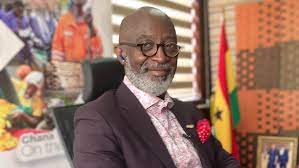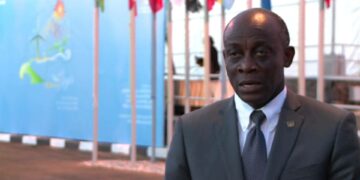GIPC CEO: Ghana close to reaching agreement with IMF
Ghana is making strides towards securing a deal with the International Monetary Fund (IMF) to revive its economy. The Chief Executive of the Ghana Investment Promotion Center (GIPC), Yofi Grant, expressed optimism that an agreement will be reached in the coming months, following the country’s efforts to reduce its debt to Gross Domestic Product (GDP) ratio to about 58% by 2026 and cut the fiscal deficit to a target of about 7% of GDP in 2023.
Mr. Grant made these remarks at the Ghanaian German Economic Association 2023 Economic Outlook report, where he disclosed that the government and the IMF had reached a Staff Level Agreement in December 2022 for a new three-year arrangement under the Extended Credit Facility (ECF) worth about $3 billion.
The IMF’s ECF program provides financial assistance to countries with balance of payments difficulties resulting from structural problems, weak policies or an external economic environment. The program aims to restore macroeconomic stability and debt sustainability, while also protecting the vulnerable.
Ghana’s pursuit of an IMF deal comes amidst the country’s challenging economic conditions, with high levels of inflation and a sharp depreciation of the Ghanaian cedi against key currencies. The government’s efforts to reduce the debt to GDP ratio and cut the fiscal deficit are part of its broader strategy to restore macroeconomic stability and create an enabling environment for sustainable economic growth.
According to Mr. Grant, Ghana has made significant progress towards presenting its program to the IMF, and he expects approval to be granted in the next few months. He noted that the IMF deal will enable the country to start building up its economy again and revive economic growth.
The revival of Ghana’s economy is critical to the country’s long-term development, as it is expected to create jobs, reduce poverty, and improve the standard of living for Ghanaians. The country’s economic challenges have been compounded by the COVID-19 pandemic, which has disrupted global supply chains, led to reduced economic activity, and increased public health expenditure.
The IMF deal is expected to provide Ghana with the necessary financial assistance to support its economic recovery efforts, including investments in critical sectors such as infrastructure, education, and healthcare. The government has also implemented various policy measures aimed at reducing the cost of doing business, improving the business environment, and attracting foreign direct investment.
Ghana’s pursuit of an IMF deal is a step in the right direction towards restoring macroeconomic stability and creating an enabling environment for sustainable economic growth. The country’s efforts to reduce the debt to GDP ratio and cut the fiscal deficit are commendable, and it is hoped that the IMF deal will provide the necessary financial assistance to support Ghana’s economic recovery efforts.








